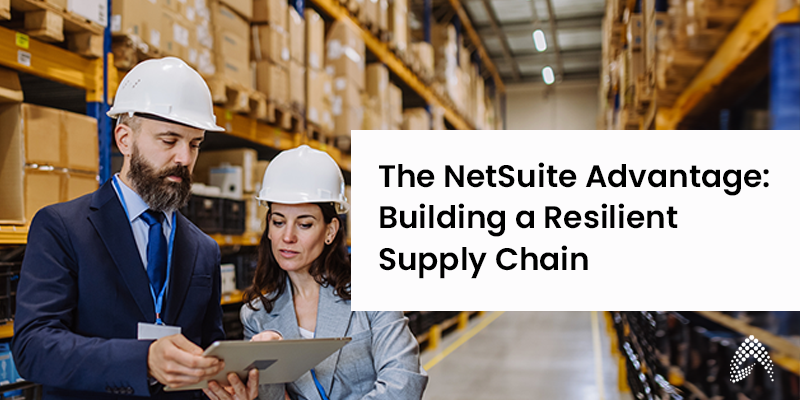The NetSuite Advantage: Building a Resilient Supply Chain

Supply chains are intricate networks that connect businesses to their customers, ensuring products and services reach their destinations efficiently and on time. However, these networks are increasingly vulnerable to disruptions caused by factors such as natural disasters, economic fluctuations, and geopolitical events. According to a recent report by McKinsey, supply chain disruptions cost the average company 45% of one year’s profits over a decade.
To thrive in today’s volatile business environment, companies must build resilient supply chains that can withstand these challenges. NetSuite provides a powerful set of tools that help businesses improve visibility, streamline processes, and mitigate risks across operations. With its AI-driven insights, NetSuite can further enhance supply chain resilience by predicting disruptions, optimizing inventory management, and automating critical decision-making processes.
Understanding Supply Chain Resilience
Robustness is essential for ensuring business continuity, protecting revenue streams, and maintaining customer satisfaction. A resilient supply chain is not merely a luxury but a necessity for organizations seeking to thrive in the face of uncertainty.
To grasp the concept of supply chain resilience, it’s crucial to recognize its key components:
- Agility: The capacity to quickly adapt to changing market conditions, customer demands, or unforeseen events.
- Flexibility: The ability to accommodate variations in demand, supply, or logistics without significant disruptions.
- Visibility: The capability to track and monitor supply chain activities in real time.
- Collaboration: The ability to work effectively with suppliers, customers, and other stakeholders.
However, building a stable supply chain is not without its challenges. Disruptions can arise from various sources, including:
- Natural disasters: Earthquakes, hurricanes, floods, etc.
- Geopolitical events: Wars, trade disputes, political instability, etc.
- Economic fluctuations: Recessions, inflation, currency fluctuations, etc.
- Technological advancements: Cyberattacks, supply chain vulnerabilities, technological obsolescence.
To mitigate the impact of these disruptions, organizations must adopt strategies such as:
- Diversifying suppliers: Reducing reliance on a single supplier.
- Implementing contingency plans: Developing and regularly testing backup plans.
- Improving visibility: Using technology to track and monitor supply chain activities.
- Building strong relationships: Fostering collaboration with suppliers and customers.
Leveraging NetSuite and AI for Supply Chain Resilience
In an era where supply chains are increasingly vulnerable to disruptions, organizations must adopt innovative technologies to remain competitive. NetSuite, a leading cloud-based Enterprise Resource Planning (ERP) solution, emerges as a critical player in strengthening supply chain resilience.
To effectively navigate the complexities of modern supply chains, businesses need robust systems that provide real-time visibility, adaptability, and intelligent decision-making capabilities. Traditional supply chain management methods often fall short in addressing challenges such as demand fluctuations, supply shortages, and unexpected disruptions. NetSuite addresses these issues by integrating advanced technologies, including artificial intelligence (AI), into its ERP framework. This integration is crucial for businesses aiming to build resilient supply chains capable of withstanding external pressures.
For instance, AI-driven analytics within NetSuite can predict disruptions by evaluating historical trends and real-time data. This proactive approach enables organizations to adjust their operations before challenges escalate, minimizing downtime and maintaining customer satisfaction. Moreover, as companies face increased pressure to optimize operations and reduce costs, relying on outdated manual processes can hinder their ability to respond swiftly. NetSuite’s automated solutions facilitate streamlined workflows, allowing organizations to allocate resources more effectively and improve overall efficiency.
Key Benefits of Using NetSuite for Supply Chain Resilience
By leveraging NetSuite’s capabilities, businesses can enhance their supply chain effectiveness and better navigate disruptions. Here are the key advantages that NetSuite offers for fostering supply chain robustness:
- Improved Visibility and Transparency: Access real-time data and AI-powered insights to forecast potential disruptions and track the movement of goods throughout the supply chain.
- Streamlined Operations: Automate repetitive tasks, reduce manual errors, and improve efficiency through AI-optimized workflows.
- Agility and Flexibility: Quickly adapt to changing conditions and disruptions with AI-driven insights, allowing for scalable operations that meet fluctuating demand.
- Enhanced Collaboration: Foster collaboration among stakeholders through a centralized platform, improving communication and decision-making with advanced data insights.
- Cost Savings: Reduce operational costs through optimization and automation, allowing organizations to focus resources where they are needed most.
Use Cases
1. Predictive Supply Chain Management:
A company using NetSuite’s AI-powered analytics can predict potential supply chain disruptions by analyzing external factors such as weather patterns or geopolitical events. AI can suggest alternative suppliers or adjust production schedules to minimize the impact. This level of proactive response helps businesses remain resilient in the face of uncertainty.
2. Inventory Optimization:
Another organization leverages NetSuite to monitor inventory levels in real time, using AI to analyze sales patterns and seasonality. By predicting demand fluctuations, the company can optimize its inventory management, reducing excess stock and minimizing the risk of stockouts. This ensures that products are available when customers need them while reducing carrying costs.
Conclusion
Building resilient supply chains is no longer just a strategic advantage; it’s essential for survival in today’s unpredictable business landscape. From natural disasters to geopolitical shifts, disruptions are inevitable, but with the right tools, they can be mitigated.
NetSuite, powered by AI, empowers businesses to navigate these challenges by offering enhanced visibility, greater efficiency, and the agility needed to adapt quickly. This results in cost savings, improved customer satisfaction, and a stronger, more resilient supply chain.
At Amzur, we have the expertise to implement customized NetSuite solutions tailored to your unique business requirements, empowering your organization to streamline its supply chain and drive long-term success. A prime example of how NetSuite can transform supply chain management is the case of Dennick FruitSource, which gained supply chain transparency through customized NetSuite shipment tracking. By tailoring NetSuite to their specific needs, Dennick FruitSource enhanced their operational efficiency and gained real-time visibility into their supply chain processes. This not only improved their decision-making but also bolstered customer satisfaction.
Explore how we can help you improve your supply chain resiliency through customized NetSuite solutions, just like Dennick FruitSource.

Director – ERP Advisory & NetSuite Solutions




